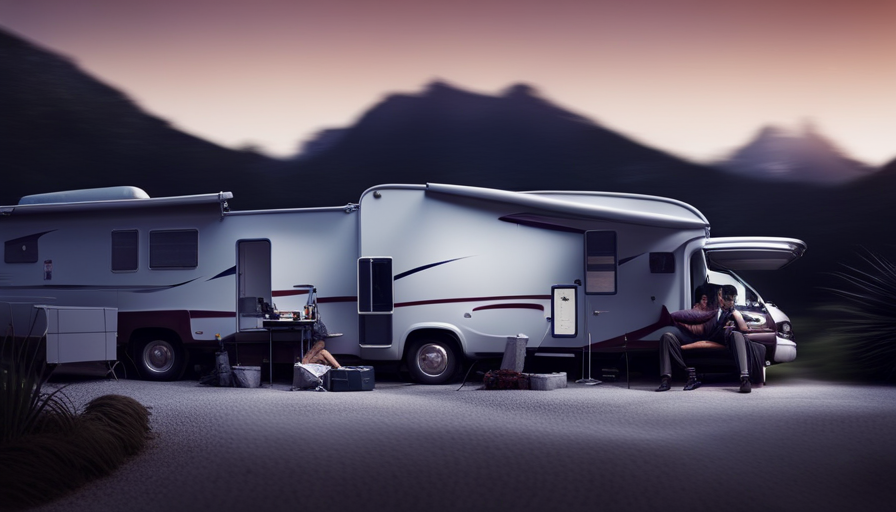Wondering about the weight of a camper trailer? Let me assure you, they’re not light by any means! Indeed, they can be surprisingly heavy. However, fear not, my adventurous friends, as I am here to illuminate this weighty subject for you.
Camper trailers come in all shapes and sizes, and their weight can vary greatly depending on various factors. From the type of trailer to the materials used, there are many elements that contribute to the overall weight. But don’t worry, I’ve got you covered with all the information you need.
In this article, we will delve into the basics of camper trailers, explore the different types and their weight variations, and discuss the factors that affect their weight. We will also uncover the average weight range for these trailers and highlight some lightweight options for easy towing.
Additionally, I will share some tips on managing the weight of your camper trailer and provide insights on weight distribution and towing capacity.
So, buckle up and get ready to embark on a weighty journey as we unravel the mysteries of camper trailer weights. Let’s dive in, shall we?
Key Takeaways
- Camper trailers can vary in weight depending on factors such as type and materials used.
- The weight of camper trailers can range from 600 to 20,000 pounds depending on the type.
- Size, construction materials, and additional amenities are factors that affect the weight of camper trailers.
- Lightweight camper trailers weigh between 1,500 to 3,500 pounds and are suitable for smaller vehicles.
Understanding the Basics of Camper Trailers
A camper trailer is like a cozy little home on wheels, making it the perfect companion for any outdoor adventure. When it comes to camper trailers, there are a few important factors to consider.
One of them is camper trailer maintenance. Just like any vehicle, regular maintenance is necessary to ensure its longevity and optimal performance. This includes checking the tires, brakes, and electrical systems, as well as keeping the interior clean and free from damage.
Another crucial aspect is choosing the right size camper trailer. The size of the trailer will depend on your specific needs and preferences. If you’re planning on traveling alone or with a partner, a smaller camper trailer might be more suitable. On the other hand, if you have a larger family or plan to go on extended trips, a bigger camper trailer with more living space would be a better fit. It’s important to consider the weight capacity of your vehicle when selecting a camper trailer.
Now, let’s delve into the types of camper trailers and their weight variations.
Types of Camper Trailers and their Weight Variations
One particular factor to consider when examining camper trailers is their weight, which can vary significantly depending on the type. The weight of a camper trailer is influenced by various factors, including the type of materials used and the weight limits set by manufacturers.
Here are three types of camper trailers and their weight variations:
-
Pop-up camper trailers: These trailers are lightweight and typically weigh between 600 to 1,500 pounds. They’re constructed with lightweight materials such as fiberglass or aluminum, making them easier to tow.
-
Travel trailers: These trailers can range in weight from 2,000 to 8,000 pounds, depending on their size and amenities. They’re usually made of heavier materials like steel or wood, providing more durability but also increasing the overall weight.
-
Fifth-wheel trailers: These larger trailers can weigh anywhere from 10,000 to 20,000 pounds. They’re designed to be towed by pickup trucks and have a unique hitch system that attaches in the bed of the truck. Due to their size and luxurious features, they tend to be much heavier than other types of camper trailers.
Understanding the weight variations among different types of camper trailers is essential when considering the towing capacity of your vehicle and the overall ease of transportation. Factors that affect the weight of camper trailers include size, construction materials, and additional amenities.
Factors that Affect the Weight of Camper Trailers
The weight of camper trailers is influenced by their size, construction materials, and the additional amenities they offer. These factors play a significant role in determining the overall weight of a camper trailer.
Firstly, the size of the trailer affects its weight as larger trailers tend to be heavier due to the increased materials required for construction. Additionally, the type of construction materials used, such as aluminum or fiberglass, can impact the weight of the trailer. Aluminum trailers are generally lighter compared to fiberglass trailers.
Furthermore, the amenities and features added to the camper trailer, such as kitchen appliances, bathrooms, and storage compartments, can also contribute to its weight.
It is important to consider the weight distribution of a camper trailer as it affects its towing stability and maneuverability. Proper weight distribution helps maintain balance and control while on the road, ensuring a safe and comfortable journey. Uneven weight distribution can lead to swaying, increased fuel consumption, and potential damage to the trailer and towing vehicle.
Understanding the factors that affect the weight of camper trailers and the importance of weight distribution is crucial for choosing the right trailer that meets your needs.
Now, let’s move on to discuss the average weight range for camper trailers.
Average Weight Range for Camper Trailers
When it comes to the weight of camper trailers, you’ll be surprised by the wide range of options available. The average weight range for camper trailers is typically between 1,500 and 5,000 pounds. However, it’s important to note that there are various factors that can influence the weight of a camper trailer.
Here are four key factors to consider:
-
Size: Larger camper trailers tend to be heavier due to the additional materials and amenities they offer. Smaller trailers, on the other hand, are generally lighter and easier to tow.
-
Construction Materials: The type of materials used in the construction of a camper trailer can significantly impact its weight. Trailers made with lightweight materials such as aluminum or fiberglass tend to be lighter than those made with heavier materials like steel.
-
Features and Amenities: Camper trailers equipped with more features and amenities, such as kitchens, bathrooms, and slide-outs, will generally weigh more than basic models with fewer amenities.
-
Payload Capacity: The weight of your belongings and equipment inside the trailer can also affect its overall weight. It’s important to consider the payload capacity of the trailer and avoid overloading it.
Now that we’ve discussed the average weight range and the factors that can impact the weight of camper trailers, let’s move on to exploring lightweight camper trailers for easy towing.
Lightweight Camper Trailers for Easy Towing
If you’re looking for a lightweight option that’s a breeze to tow, you’ll love these easy-to-handle camper trailers. Lightweight camper trailers are designed to be compact and efficient, making them perfect for those who want to travel light and easily maneuver through tight spaces.
These trailers typically weigh between 1,500 to 3,500 pounds, making them much lighter than their larger counterparts. One of the main advantages of lightweight camper trailers is their ease of towing. With their reduced weight, they can be towed by smaller vehicles, such as SUVs or even some sedans. This means you don’t need a heavy-duty truck to transport your camper trailer, saving you money on fuel costs.
Despite their smaller size, lightweight camper trailers still offer a range of features and amenities. Many models come equipped with sleeping quarters, kitchenettes, and even bathrooms, providing you with all the comforts of home on the road. Additionally, these trailers often have clever storage solutions and efficient layouts, making the most of the available space.
Transitioning into the subsequent section about heavy-duty camper trailers for off-road adventures, it’s important to note that while lightweight camper trailers excel in easy towing and maneuverability, heavy-duty options are built to withstand rugged terrains and challenging conditions.
Heavy-Duty Camper Trailers for Off-Road Adventures
Get ready to experience the thrill of off-road adventures like never before with these rugged, adventure-ready monsters of the road. These heavy-duty camper trailers are built to conquer any terrain, allowing you to venture off the beaten path and explore the great outdoors.
Here are four reasons why these trailers are perfect for your off-road escapades:
-
Off-road camping essentials: These trailers are equipped with all the necessary features to make your off-road camping experience comfortable and convenient. From spacious sleeping quarters to fully equipped kitchens, you’ll have everything you need for a memorable trip.
-
Durability and ruggedness: These trailers are designed to withstand the toughest conditions. With reinforced chassis, heavy-duty suspension systems, and off-road tires, they can handle rough terrains, steep inclines, and even water crossings with ease.
-
Off-road camper modifications: Many of these trailers come with additional modifications that enhance their off-road capabilities. These may include lifted suspension, rock sliders, skid plates, and upgraded axles, allowing you to confidently navigate through challenging terrains.
-
Versatility and adaptability: These trailers offer plenty of storage space for all your gear, making them ideal for extended off-road trips. You can easily bring along bikes, kayaks, and other outdoor equipment, ensuring that you’re fully prepared for any adventure.
Now that you know the advantages of heavy-duty camper trailers for off-road adventures, let’s explore some tips for managing their weight without compromising on performance.
Tips for Managing the Weight of Your Camper Trailer
To effectively manage your off-road adventure, you need to consider the weight of your camping rig – how can you ensure a smooth ride without compromising performance?
Managing weight distribution and towing safety considerations are crucial. First, it’s essential to distribute the weight evenly throughout your camper trailer. Uneven weight distribution can cause instability and difficulty in towing. Make sure to place heavier items closer to the trailer’s axle and secure them properly to prevent shifting during travel.
Additionally, check your towing vehicle’s weight capacity and ensure it matches or exceeds the trailer’s weight. Understanding weight distribution and towing capacity is vital for safe and efficient travels.
When it comes to towing safety considerations, there are a few key points to keep in mind. Always double-check that your towing vehicle is properly equipped for the load you are carrying. This includes having the appropriate hitch, brakes, and suspension system. Additionally, be mindful of the trailer’s height and width, as they can impact stability and maneuverability. Consider using towing mirrors to enhance visibility.
Lastly, maintain a safe driving speed and keep a reasonable distance from other vehicles on the road.
By managing weight distribution and adhering to towing safety considerations, you can enjoy a smooth and secure off-road adventure. Understanding weight distribution and towing capacity is crucial for a successful trip.
In the next section, we will delve deeper into these concepts and explore how they impact your camper trailer’s performance.
Understanding Weight Distribution and Towing Capacity
Ensure a smooth and secure off-road adventure by understanding how weight distribution and towing capacity impact your performance. When it comes to camper trailers, weight distribution plays a crucial role in maintaining stability and control while towing. It is important to distribute the weight evenly to avoid putting excess strain on certain areas of the vehicle. A well-balanced load will also help prevent swaying and fishtailing, ensuring a safer journey.
To visualize the importance of weight distribution, imagine a 2 column and 5 row table. In the first column, we have the different components of the camper trailer, such as the kitchen, bathroom, bedroom, and storage areas. In the second column, we have the corresponding percentage of weight that each component contributes to the overall load. By distributing the weight evenly across these areas, you can ensure that the camper trailer remains stable during travel.
Towing capacity is another crucial factor to consider. It refers to the maximum weight that a vehicle can safely tow. Exceeding the towing capacity can lead to poor braking performance, reduced control, and potential damage to both the vehicle and the trailer. It is essential to check the manufacturer’s guidelines and ensure that your vehicle is equipped to handle the weight of your camper trailer.
Understanding weight distribution and towing capacity is vital for a successful and safe off-road adventure. By following these guidelines, you can enjoy a smooth and secure journey. Now, let’s discuss the next section about safety considerations when towing a camper trailer.
Safety Considerations when Towing a Camper Trailer
One key aspect to keep in mind while towing a camper trailer is prioritizing safety. It’s crucial to understand the towing capacity limits of your vehicle and ensure that you don’t exceed them. Exceeding the towing capacity can put a strain on your vehicle’s engine, transmission, and brakes, leading to potential accidents and damage.
Additionally, trailer sway control is an important safety feature to consider. This system helps minimize the side-to-side movement of the trailer while driving, enhancing stability and reducing the risk of accidents caused by trailer sway. By investing in a camper trailer with built-in sway control or using an aftermarket sway control device, you can greatly enhance the safety of your towing experience.
Remember, safety should always be the top priority when towing a camper trailer.
Finding the right camper trailer for your needs is essential for a successful and safe towing experience. Understanding weight distribution, towing capacity limits, and investing in features like trailer sway control are crucial steps in ensuring your safety on the road. So, when choosing a camper trailer, make sure it aligns with your vehicle’s towing capacity and includes safety features that’ll enhance your overall towing experience.
Conclusion: Finding the Right Camper Trailer for Your Needs
Now that we’ve discussed the important safety considerations when towing a camper trailer, let’s move on to the conclusion: finding the right camper trailer for your needs.
This is a crucial step in ensuring a successful and enjoyable camping experience.
When it comes to finding the right size camper trailer, it’s essential to evaluate the weight capacity of your vehicle. You don’t want to choose a trailer that exceeds the maximum towing capacity of your car or truck. This can put undue stress on your vehicle’s engine, suspension, and brakes, making it unsafe to tow.
To determine the weight capacity of your vehicle, you can refer to the owner’s manual or contact the manufacturer directly. Once you have this information, you can start looking for camper trailers that fall within your vehicle’s towing limits.
Additionally, it’s important to consider your specific camping needs and preferences. Do you prefer a smaller, more compact trailer for easy maneuverability? Or do you need a larger trailer with more sleeping and living space? Think about the number of people you’ll be camping with, the amenities you desire, and the type of terrain you’ll be traversing.
By carefully evaluating the weight capacity of your vehicle and considering your camping needs, you’ll be able to find the perfect camper trailer that meets your requirements and ensures a safe and enjoyable camping experience.
Frequently Asked Questions
Can I tow a camper trailer with my sedan?
Sure, you may be able to tow a camper trailer with your sedan, but it depends on the towing capacity of your vehicle.
It’s crucial to consider safety considerations before attempting to tow. Make sure your sedan has the necessary towing capacity to handle the weight of the trailer. Additionally, check the manufacturer’s guidelines for towing with your specific sedan model.
Safety should always be the top priority when towing a camper trailer.
How much weight can a camper trailer carry?
The weight capacity of a camper trailer depends on its design and construction. It’s crucial to be aware of the limitations of camper trailer weight to ensure safe towing.
To maximize the weight capacity, consider distributing the load evenly, packing lighter items on top, and removing any unnecessary items. Additionally, regularly check the trailer’s tires, suspension, and brakes to ensure they can handle the weight.
Remember, exceeding the weight limit can lead to poor handling, increased fuel consumption, and potential damage to the trailer.
Are there any limitations on the weight of items I can store in a camper trailer?
When it comes to storing items in a camper trailer, there are definitely limitations on weight that you need to be aware of. It’s important to adhere to these weight restrictions not only for the safety of your belongings but also for the safety of yourself and others on the road. Overloading a camper trailer can cause it to become unstable and difficult to handle.
Additionally, many roads have weight restrictions in place to prevent damage to the infrastructure. Always check the weight limits and distribute the load evenly to ensure a smooth and safe journey.
Are there any weight restrictions for camper trailers on certain roads or bridges?
Yes, there are weight restrictions for camper trailers on certain roads and bridges. It’s important to note that different states and regions may have varying regulations.
These weight restrictions are in place to ensure the safety of both the trailer and other road users. It’s crucial to comply with the legal requirements for towing a camper trailer, including adhering to maximum weight limits, which can vary depending on the road or bridge being used.
What are some common mistakes people make when managing the weight of their camper trailers?
Common misconceptions about managing the weight of camper trailers include assuming that weight distribution doesn’t matter and that it’s okay to exceed the trailer’s weight capacity.
To avoid these mistakes, it’s important to follow some tips for distributing weight properly. Firstly, ensure that heavier items are placed closer to the trailer’s axle for better stability.
Secondly, regularly check the trailer’s weight and stay within its capacity.
Lastly, properly secure and balance the load to prevent swaying during travel.
What Is the Weight Range for Camper Shells?
When it comes to camper shells, it’s essential to consider their weight range for various purposes. Camper shell weight information helps determine the compatibility with a specific vehicle and its load capacity. This information assists in making informed decisions while choosing a camper shell that suits your needs and ensures safe transportation.
Conclusion
After delving into the intricacies of camper trailer weights, it’s clear that finding the right one for your needs is no light matter. From understanding the basics to considering factors that affect weight, it’s essential to do your research.
But fear not, for there are lightweight options available for easy towing. Managing weight and understanding distribution and towing capacity are key. And let’s not forget about safety – it’s crucial to prioritize that too.
So, happy towing, fellow adventurers, and may you find the perfect camper trailer to carry you on your next memorable journey.










